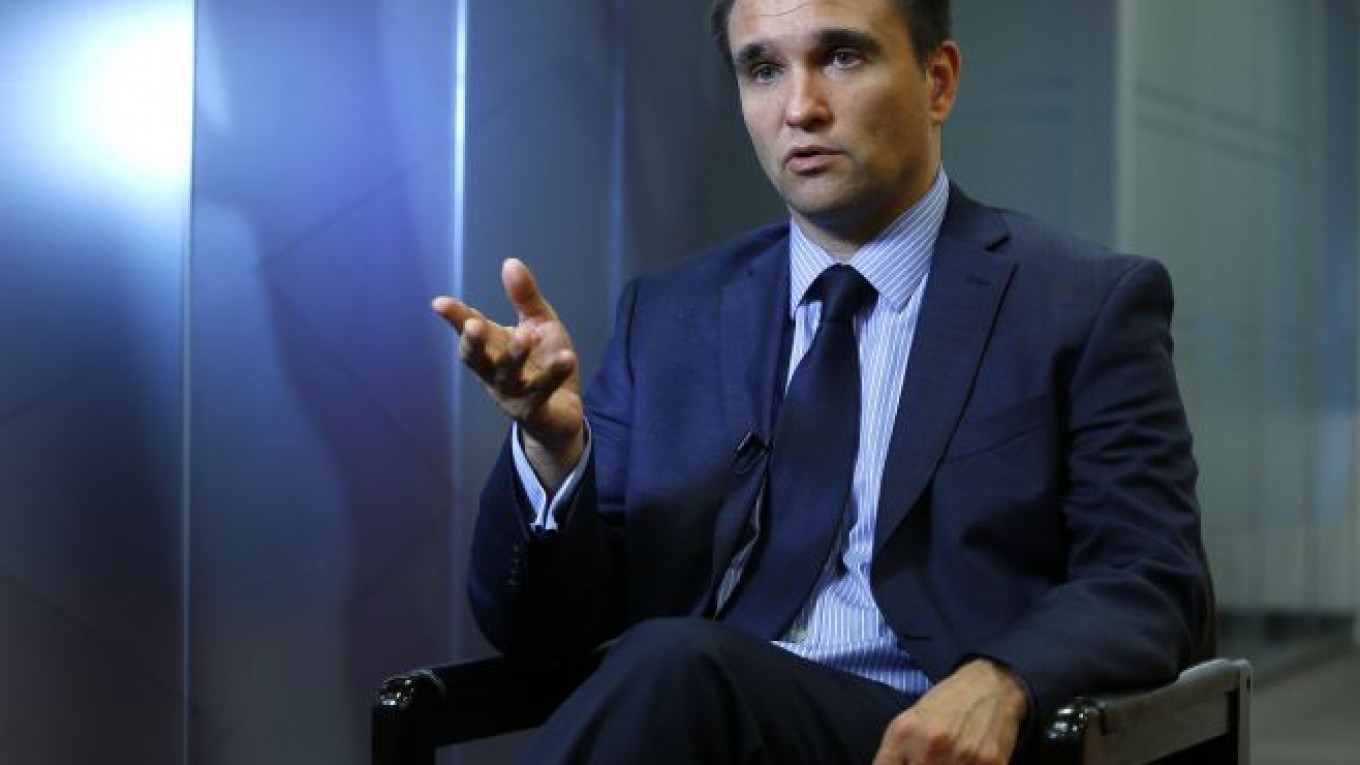Ukraine warned the European Union on Wednesday not to accept pro-Russian rebels carving out a de facto state and said that unlike other "frozen conflicts" in the former Soviet Union it could destabilize all of Europe.
Foreign Minister Pavlo Klimkin, during a visit with EU and NATO officials in Brussels, urged Moscow to dissuade separatists from holding their own elections in the eastern regions of Donetsk and Luhansk next month. He said local people would do better to vote in local elections organized by Kiev in December.
"Fake elections" organized by leaders of self-styled, pro-Russian people's republics would, Klimkin said, reinforce the appearance that eastern Ukraine is becoming a long-term "frozen conflict" like the self-proclaimed republic Transdnestr or Abkhazia, Moscow-backed breakaway regions of former-Soviet Moldova and Georgia.
"A frozen conflict in Donetsk and Luhansk, let us not have any illusions, could not be stabilized as for example Transdnestr or Abkhazia ... It would bring us more instability, more destabilisation, not only for the whole of Ukraine but for the whole of Europe," Klimkin said.
He insisted he was not saying so to "blackmail" western European states into stepping up actions, such as economic sanctions, against Russia, or to get NATO to increase non-military assistance to Kiev.
The European Union is due to review some of its sanctions against Russia next month.
Klimkin said people in eastern Ukraine had to "get rid of the terrorists" running the region, and he said Moscow should help defuse the conflict there, which has continued despite a cease-fire agreed in early September.
On Wednesday, the United Nations said the struggle was claiming about 10 lives a day among government troops, pro-Russian separatists and civilians.
Elections
Acknowledging that Kiev could not easily prevent people in the largely Russian-speaking east from holding their own vote on Nov. 2, he urged Moscow not to recognize that process and to back Kiev's offers of more autonomy for the regions.
"It's also about Russia saying extremely clearly that such elections are no option at all," Klimkin said. "Russia should discourage Donetsk and Luhansk from having these elections and try to put the process on the track to stabilization."
Ukrainian President Petro Poroshenko, elected in May in a vote that many in the east ignored, has called a parliamentary election for Oct. 26. He hopes that can undercut accusations from President Vladimir Putin that the Western-backed Kiev leadership, which took power after a popular uprising in February, lacks legitimacy and is hostile to ethnic Russians.
"We have to get on track the all-inclusive, all-Ukrainian political process in Donetsk and Luhansk," Klimkin said. "We are ready for more decentralization."
The foreign minister, a 46-year-old career diplomat appointed in June, said meetings with EU officials and with new NATO secretary-general Jens Stoltenberg had confirmed further support for Ukraine, including NATO-brokered funding for efforts to strengthen Kiev's underfinanced armed forces.
He renewed appeals for Moscow not to disrupt Ukraine's efforts to move closer to the EU, and said Russia should see its own advantage in a closer relationship across the continent.
"We are not, so to speak, about to depart Russia, to make a kind of break, to establish a sort of wall between Russia and us," he said of Ukraine's main trading partner.
"Russia should be interested actually in stabilization for the whole region and for the possibilities to link, to communicate effectively with Europe because Russian future without this communication is simply unimaginable."
A Message from The Moscow Times:
Dear readers,
We are facing unprecedented challenges. Russia's Prosecutor General's Office has designated The Moscow Times as an "undesirable" organization, criminalizing our work and putting our staff at risk of prosecution. This follows our earlier unjust labeling as a "foreign agent."
These actions are direct attempts to silence independent journalism in Russia. The authorities claim our work "discredits the decisions of the Russian leadership." We see things differently: we strive to provide accurate, unbiased reporting on Russia.
We, the journalists of The Moscow Times, refuse to be silenced. But to continue our work, we need your help.
Your support, no matter how small, makes a world of difference. If you can, please support us monthly starting from just $2. It's quick to set up, and every contribution makes a significant impact.
By supporting The Moscow Times, you're defending open, independent journalism in the face of repression. Thank you for standing with us.
Remind me later.


